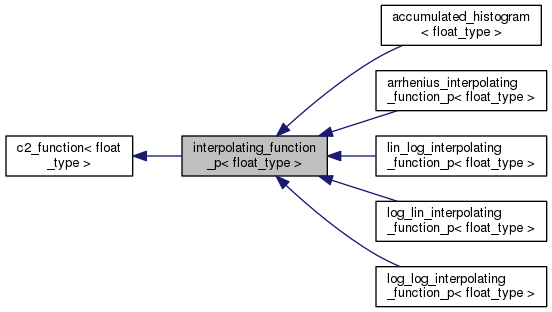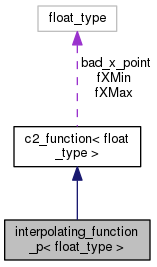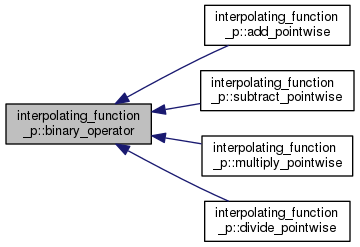create a cubic spline interpolation of a set of (x,y) pairsThis is one of the main reasons for c2_function objects to exist.
More...
|
| | interpolating_function_p () |
| | an empty linear-linear cubic-spline interpolating_function_p More...
|
| |
| | interpolating_function_p (const c2_function_transformation< float_type > &transform) |
| | an empty cubic-spline interpolating_function_p with a specific transform More...
|
| |
interpolating_function_p
< float_type > & | load (const std::vector< float_type > &x, const std::vector< float_type > &f, bool lowerSlopeNatural, float_type lowerSlope, bool upperSlopeNatural, float_type upperSlope, bool splined=true) |
| | do the dirty work of constructing the spline from a function. More...
|
| |
interpolating_function_p
< float_type > & | load_pairs (std::vector< std::pair< float_type, float_type > > &data, bool lowerSlopeNatural, float_type lowerSlope, bool upperSlopeNatural, float_type upperSlope, bool splined=true) |
| | do the dirty work of constructing the spline from a function. More...
|
| |
interpolating_function_p
< float_type > & | sample_function (const c2_function< float_type > &func, float_type amin, float_type amax, float_type abs_tol, float_type rel_tol, bool lowerSlopeNatural, float_type lowerSlope, bool upperSlopeNatural, float_type upperSlope) |
| | do the dirty work of constructing the spline from a function. More...
|
| |
interpolating_function_p
< float_type > & | load_random_generator_function (const std::vector< float_type > &bincenters, const c2_function< float_type > &binheights) |
| | initialize from a grid of points and a c2_function (un-normalized) to an interpolator which, when evaluated with a uniform random variate on [0,1] returns random numbers distributed as the input function. More...
|
| |
interpolating_function_p
< float_type > & | load_random_generator_bins (const std::vector< float_type > &bins, const std::vector< float_type > &binheights, bool splined=true) |
| |
| virtual float_type | value_with_derivatives (float_type x, float_type *yprime, float_type *yprime2) const |
| | get the value and derivatives. More...
|
| |
| virtual | ~interpolating_function_p () |
| | destructor More...
|
| |
virtual
interpolating_function_p
< float_type > & | clone () const |
| |
| void | get_data (std::vector< float_type > &xvals, std::vector< float_type > &yvals) const |
| |
| void | get_internal_data (std::vector< float_type > &xvals, std::vector< float_type > &yvals, std::vector< float_type > &y2vals) const |
| |
| void | set_lower_extrapolation (float_type bound) |
| |
| void | set_upper_extrapolation (float_type bound) |
| |
interpolating_function_p
< float_type > & | unary_operator (const c2_function< float_type > &source) const |
| |
interpolating_function_p
< float_type > & | binary_operator (const c2_function< float_type > &rhs, const c2_binary_function< float_type > *combining_stub) const |
| |
interpolating_function_p
< float_type > & | add_pointwise (const c2_function< float_type > &rhs) const |
| |
interpolating_function_p
< float_type > & | subtract_pointwise (const c2_function< float_type > &rhs) const |
| |
interpolating_function_p
< float_type > & | multiply_pointwise (const c2_function< float_type > &rhs) const |
| |
interpolating_function_p
< float_type > & | divide_pointwise (const c2_function< float_type > &rhs) const |
| |
| void | clone_data (const interpolating_function_p< float_type > &rhs) |
| |
| const std::string | cvs_header_vers () const |
| | get versioning information for the header file More...
|
| |
| const std::string | cvs_file_vers () const |
| | get versioning information for the source file More...
|
| |
| virtual | ~c2_function () |
| | destructor More...
|
| |
| float_type | operator() (float_type x) const |
| | evaluate the function in the classic way, ignoring derivatives. More...
|
| |
| float_type | operator() (float_type x, float_type *yprime, float_type *yprime2) const |
| | get the value and derivatives. More...
|
| |
| float_type | find_root (float_type lower_bracket, float_type upper_bracket, float_type start, float_type value, int *error=0, float_type *final_yprime=0, float_type *final_yprime2=0) const |
| | solve f(x)==value very efficiently, with explicit knowledge of derivatives of the function More...
|
| |
| float_type | partial_integrals (std::vector< float_type > xgrid, std::vector< float_type > *partials=0, float_type abs_tol=1e-12, float_type rel_tol=1e-12, int derivs=2, bool adapt=true, bool extrapolate=true) const |
| |
| float_type | integral (float_type amin, float_type amax, std::vector< float_type > *partials=0, float_type abs_tol=1e-12, float_type rel_tol=1e-12, int derivs=2, bool adapt=true, bool extrapolate=true) const |
| | a fully-automated integrator which uses the information provided by the get_sampling_grid() function to figure out what to do. More...
|
| |
c2_piecewise_function_p
< float_type > * | adaptively_sample (float_type amin, float_type amax, float_type abs_tol=1e-12, float_type rel_tol=1e-12, int derivs=2, std::vector< float_type > *xvals=0, std::vector< float_type > *yvals=0) const |
| | create a c2_piecewise_function_p from c2_connector_function_p segments which is a representation of the parent function to the specified accuracy, but maybe much cheaper to evaluate More...
|
| |
| float_type | xmin () const |
| |
| float_type | xmax () const |
| |
| void | set_domain (float_type amin, float_type amax) |
| |
| size_t | get_evaluations () const |
| |
| void | reset_evaluations () const |
| | reset the counter More...
|
| |
| void | increment_evaluations () const |
| | count evaluations More...
|
| |
| bool | check_monotonicity (const std::vector< float_type > &data, const char message[]) const |
| | check that a vector is monotonic, throw an exception if not, and return a flag if it is reversed More...
|
| |
| virtual void | set_sampling_grid (const std::vector< float_type > &grid) |
| | establish a grid of 'interesting' points on the function. More...
|
| |
| std::vector< float_type > * | get_sampling_grid_pointer () const |
| | get the sampling grid, which may be a null pointer More...
|
| |
| virtual void | get_sampling_grid (float_type amin, float_type amax, std::vector< float_type > &grid) const |
| |
| void | preen_sampling_grid (std::vector< float_type > *result) const |
| | The grid is modified in place. More...
|
| |
| void | refine_sampling_grid (std::vector< float_type > &grid, size_t refinement) const |
| |
| c2_function< float_type > & | normalized_function (float_type amin, float_type amax, float_type norm=1.0) const |
| | create a new c2_function from this one which is normalized on the interval More...
|
| |
| c2_function< float_type > & | square_normalized_function (float_type amin, float_type amax, float_type norm=1.0) const |
| |
| c2_function< float_type > & | square_normalized_function (float_type amin, float_type amax, const c2_function< float_type > &weight, float_type norm=1.0) const |
| | create a new c2_function from this one which is square-normalized with the provided weight on the interval More...
|
| |
| c2_sum_p< float_type > & | operator+ (const c2_function< float_type > &rhs) const |
| | factory function to create a c2_sum_p from a regular algebraic expression. More...
|
| |
| c2_diff_p< float_type > & | operator- (const c2_function< float_type > &rhs) const |
| | factory function to create a c2_diff_p from a regular algebraic expression. More...
|
| |
| c2_product_p< float_type > & | operator* (const c2_function< float_type > &rhs) const |
| | factory function to create a c2_product_p from a regular algebraic expression. More...
|
| |
| c2_ratio_p< float_type > & | operator/ (const c2_function< float_type > &rhs) const |
| |
c2_composed_function_p
< float_type > & | operator() (const c2_function< float_type > &inner) const |
| | compose this function outside another. More...
|
| |
| float_type | get_trouble_point () const |
| | Find out where a calculation ran into trouble, if it got a nan. If the most recent computation did not return a nan, this is undefined. More...
|
| |
| void | claim_ownership () const |
| | increment our reference count. Destruction is only legal if the count is zero. More...
|
| |
| size_t | release_ownership_for_return () const |
| | decrement our reference count. Do not destroy at zero. More...
|
| |
| void | release_ownership () const |
| |
| size_t | count_owners () const |
| | get the reference count, mostly for debugging More...
|
| |
| void | fill_fblock (c2_fblock< float_type > &fb) const |
| | fill in a c2_fblock<float_type>... a shortcut for the integrator & sampler More...
|
| |
template<typename float_type = double>
class interpolating_function_p< float_type >
create a cubic spline interpolation of a set of (x,y) pairs
This is one of the main reasons for c2_function objects to exist.
It provides support for cubic spline interpolation of data provides from tables of x, y pairs. It supports automatic, transparent linearization of the data before storing in its tables (through subclasses such as log_lin_interpolating_function, lin_log_interpolating_function, and log_log_interpolating_function) to permit very high accuracy representations of data which have a suitable structure. It provides utility functions LinearInterpolatingGrid() and LogLogInterpolatingGrid() to create grids for mapping other functions onto a arithmetic or geometric grid.
In its simplest form, an untransformed cubic spline of a data set, using natural boundary conditions (vanishing second derivative), is created as:
std::vector<double> xvals(10), yvals(10);
double yprime, yprime2;
double y=myfunc(
x,&yprime, &yprime2);
The factory function c2_factory::interpolating_function() creates *new interpolating_function_p()
Definition at line 1513 of file c2_function.hh.


 Public Member Functions inherited from c2_function< float_type >
Public Member Functions inherited from c2_function< float_type > Protected Member Functions inherited from c2_function< float_type >
Protected Member Functions inherited from c2_function< float_type > Protected Attributes inherited from c2_function< float_type >
Protected Attributes inherited from c2_function< float_type >




